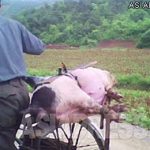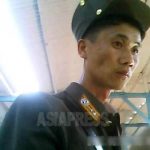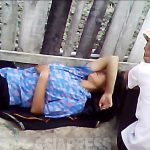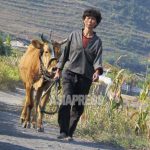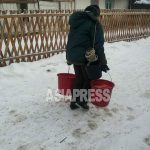Not a matter of absolute shortage, a matter of distribution and access - 1/2
2011/September/10
ISHIMARU Jiro - Chief Editor/Rimjin-gang 1/2
While the military suffers food shortages, rice is being sold in the market.

North Korea's economic status is at its worst since the mass starvation of the late 90's.
North Korea is now in the 'Bori-koge' period. Bori-koge is the season of food shortages which comes in spring, when the harvest of the previous year has all been eaten and stocks run low. Bori means 'barley', while koge means 'mountain pass'.
In the past, 'Bori-koge' was a common word for Korean people. It was used in feudal times, when the country suffered from regular famines. The word was then revived at the time of the great famine of the 1990s, when North Korea's economic situation was the worst in its history. The Bori-koge period arises in around April, when the previous autumn's harvest begins to run out. This is then gradually relieved in the second half of June when the year's first potato harvest arrives, and ends completely in September when the autumn harvest of grain can be gathered.
I have been continuously observing food and economic conditions in North Korea for more than 15 years. Analyzing my direct interviews with various North Koreans, their own reports and information from different sources, it appears that this year's Bori-koge is serious, the worst since the late 90's, a time which ended in mass starvation and social confusion.

I visited the North Korea-China border zone in May, at the same time Kim Jong-il was visiting China. While there, I got in contact with Kim Dong-cheol, one of the Rimjin-gang reporters who continue to make undercover reports from inside North Korea.
Kim, who lives in North Pyongan Province, secretly crossed the Tumen River to come and see me.
He had made undercover videos in different places in North Korea between January and April. The footage showed a harsh reality.Many children wandering, begging in the market. Many had lost parents, or been abandoned.
Another showed the rapid deterioration of food supplies and rationing to the military.
"I am ashamed to say what we are eating in the military. Within my troop of 100 soldiers, half are malnourished," a cadet soldier in his 20's complains in Kim's secret video.
Kim talks about military food conditions.
"A young soldier came to my house and said to me, 'Will you give some food to us?' He said that he would be scolded by his superiors if he could not bring some food back to the compound. Another soldier confessed that he had been eating just 100 grams (3.5 oz) of corn each meal.
Even if you sat still all day, you'd still be malnourished on such a small amount of food. Many units only eat corn meal with salt, since they don't get any side dishes. The military suffers chronic food shortages, but this is the first time I've seen them faced with such serious conditions."
- To be continued in PART 2
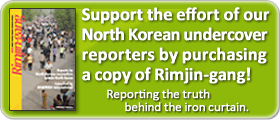
* Editor's notes on North Korean reporters
ALL REPORTS >>>
ARCHIVE(pdf) >>
